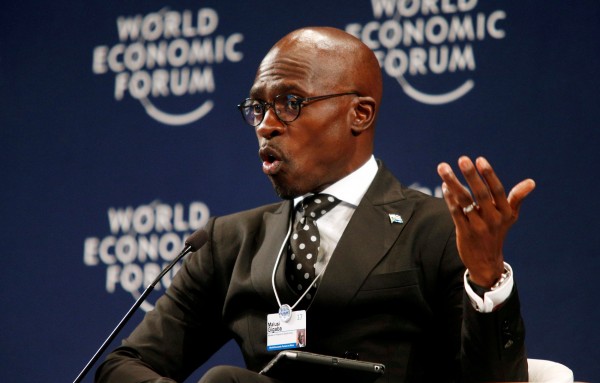Finance Minister Malusi Gigaba on Thursday denied that the recent Cabinet reshuffle which saw him catapulted to head up National Treasury had weakened the rand against other currencies.
This comes after the rand went in freefall on 30 March, plummeting four percent to R13.29 to the US dollar, following the news that President Jacob Zuma had fired Pravin Gordhan as well as his deputy Mcebisi Jonas.
Speaking on the topic of Africa’s economic growth outlook at the World Economic Forum (WEF) on Africa in Durban, Gigaba said that the rand had always been a volatile currency and that was not because of changes in Cabinet.
“The exchange rate is okay. The rand volatility does not emanate from the Cabinet reshuffle. It has absolutely nothing to do with changes in government because that does not happen frequently,” Gigaba said.
“It could have on occasion have to do with the changes in the finance ministry, but it’s been volatile not as a result of that, for quite a long time. There was a time when it depreciated close to R18 [to the US dollar].”
Session moderator and editor-in-chief at CNBC Africa, Bronwyn Nielsen, came to Gigaba’s aid and said that even currency strategists actually did not know where the currency was going, but pointed out that the rand had weakened as well when South Africa had three finance ministers in one week.
Addressing investor fears about South Africa’s political climate and instability, Gigaba said that investors had no reason to fear the change of guard when Zuma leaves office as the ruling African National Congress (ANC) and South Africa’s president, as the country was a constitutional democracy with strong institutions.
“South Africa is a democratic country. We go through periodic elections and I don’t think anybody should panic when it’s time. We know that every five years there’s going to be an elective conference of the ruling party, there’s going to be general elections. It’s part of democracy and we need to accept it. That at that moment, there will be a contestation for leadership and we may emerge with new leadership,” Gigaba said.
“It actually happens virtually everywhere else in the world, in some countries every four years, in some countries it even happens abruptly as a result of unconstitutional illegal leadership changes.
“In our country, all the leadership changes that we’ve had, have been through a democratic process, there’s been succession and a peaceful transition from one administration to the next, and that should really not cause anybody to panic. We should accept that it’s going to happen.”
The curtain will come down on Friday at WEF on Africa where more that 1,000 delegates from over 100 countries have gathered to discuss inclusive growth for the continent.
[Source: African News Agency]





 WhatsApp us
WhatsApp us 

